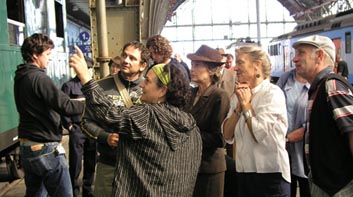
Director's Statement
Blessed Is the Match is a mother-daughter love story. It is a film set against the backdrop of the Holocaust – a subject that is no stranger to the documentary world. But it is a film unlike any other, not only because of the incredible story of Hannah Senesh, but also because of the experience of Hannah’s mother Catherine, whose raw and revelatory memoirs complement the youthful writings of her daughter and provide the film with its emotional core.
I first read Hannah’s diary in junior high and was captivated by her courage and touched by her vulnerability. Later, as a history student at UC-Berkeley, where I wrote my senior thesis on the Nazi SS, Hannah’s story continued to inspire me. Why? She fought back. In the face of monolithic evil, she chose to act by joining a noble, against-all-odds mission.
For the past 20 years, as I’ve worked as a documentary filmmaker, my interest in Hannah has persisted. But my fascination with her story has come to include her mother’s experience as well. This is not just because I’ve changed from a student Hannah’s age to a mother closer to Catherine’s age (although that could be part of it). But in many ways Catherine is a figure we can understand better than Hannah. Hannah is a modern-day Joan of Arc, the type of heroine who comes along once in a century – bold, brilliant and uncommonly courageous. Catherine, on the other hand, represents us all. As a worried mother, she watches her child drift away, pursue her own path and then make the ultimate sacrifice. Worst of all, Catherine must have spent the remainder of her days wondering if Hannah’s motivation was to save the Jews of Hungary, or simply to save her.
In 2005, my producing partner, Lisa Thomas, and I initiated talks with Eitan Senesh, Hannah’s nephew, about making a documentary on Hannah. After traveling to Israel to meet Eitan and his brother David in person, they granted us the rights to Hannah’s life story and unprecedented access to the family archive. In this archive – in addition to Hannah’s diary – are hundreds of unpublished letters between Hannah and Catherine and nearly 1,300 never-before-seen photos of remarkable quality.
In 2006 and 2007, we shot most of the film in Hungary, Israel and the Czech Republic. Our interview subjects included world-renowned scholars, survivors, witnesses and friends of Hannah’s from Budapest and Palestine. We learned about life in the Yishuv from pioneering members of Hannah’s kibbutz and from Israeli President Shimon Peres, who met Hannah when they were in their twenties. We gained insight into Hannah’s mission from parachutists Surika Braverman and Reuven Dafni. Perhaps the most chilling were interviews with four women who were in the same Gestapo and Hungarian prisons as Catherine and Hannah Senesh in 1944.
We believe that Blessed Is the Match does justice to Hannah, to her character and her courage, but we hope it does more than this. By telling the story through Catherine’s eyes, we hope that in the end, the film is a moving mother-daughter story. This honors the legacies of both Hannah and Catherine Senesh.
Roberta Grossman
May 2008
